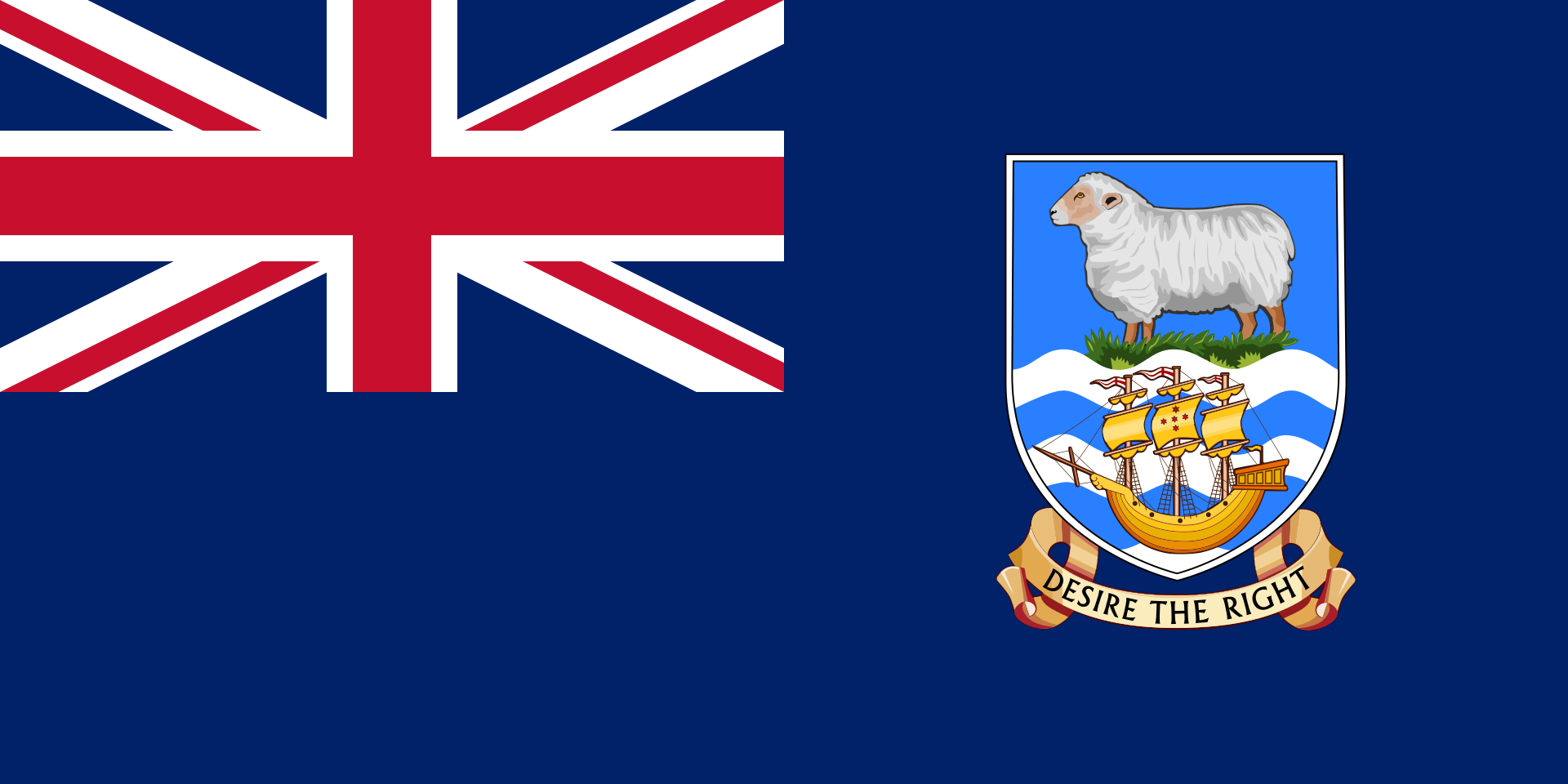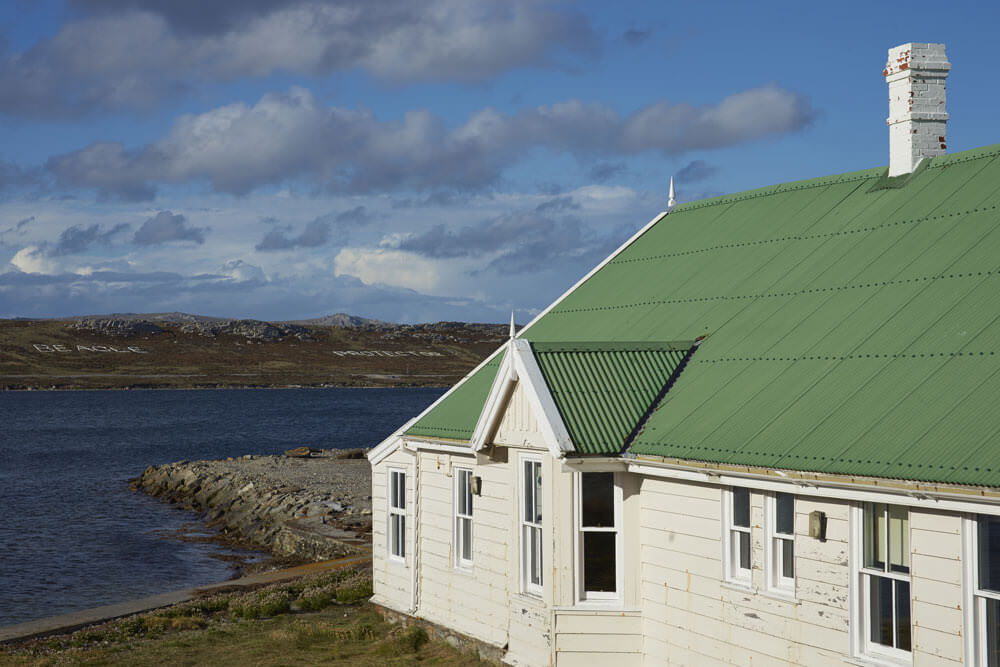Falkland Islands

Capital city: Stanley
Population: 3,505 (2021 est.)
Land area: 12,173 km²
Official language: English
Legal system: English common law and local statutes
Time zone: GMT-3
Currency: Falkland Islands pound (FKP)
GDP: £254.7 million (2018)
Main industries: fish and wool processing; tourism
Principal exports: wool, hides, meat, venison, fish, squid
Also known as the Malvinas Islands, the Falkland Islands is an internally self-governing overseas territory of the United Kingdom. It is an archipelago located in the South Atlantic Ocean. The Islands have about and areas of 12,000 square kilometres of which comprise East, West Falkland and 740 smaller islands. The capital of the islands, Stanley, is the largest settlement located on East Falkland. In addition, the Falkland Islands are a British overseas territory meaning that the United Kingdom takes responsibility for their defence and foreign affairs.
Demographics
The population of the Falkland Islands is English-speaking and consists primarily of Falklanders of African-Irish descent (88% of population). 80% of the population lives in Stanley and the pattern of living on the islands is sharply differentiated between Stanley and the small, isolated sheep-farming communities outside of the capital. Protestant Christianity is the major religion of the islands; other religions practiced on the island include Catholicism and Rastafarian.

History
The British were the first to settle in 1765 at West Falkland but were later driven off by the Spanish who had bought out the French settlement in 1767. Spain also claimed a settlement on East Falkland called Soledad Island until 1811. In 1820 the Buenos Aires government, which had declared its independence from Spain in 1816, proclaimed its sovereignty over the Falklands. In early 1833 a British force expelled the few remaining Argentine officials and in 1841 a British civilian lieutenant governor was appointed for the Falklands. By 1885, 1,800 people on the islands began living there with a self-supporting lifestyle; an illegal occupation according to Argentina.
After World War II the issue of sovereignty over the Falkland Islands shifted to the United Nations when, in 1964, the islands’ status was debated by the UN committee on decolonization. A year later, the UN General Assembly approved a resolution for Britain and Argentina to discuss a peaceful solution and even though the discussions were still proceeding in February 1982, Argentina’s military government invaded the Falklands on April 2nd. In a referendum held in March 2013, islanders of the Falkland Islands unanimously voted in favour of Britain.
Falkland Island made their debut in the 1982 Commonwealth Games in Australia. Specifically, the Falkland Island teams have competed in sports such as Badminton, Lawn Bowls and Shooting. Moreover, the Islands compete and partake in both the Commonwealth Games and the Commonwealth Youth Games.
Legal System and government
Most of the executive authority at the Falkland Islands is vested in the British monarchy. The Islands government is run by a governor previously appointed by the British crown. The governor s advised by an Executive Council which consists of three elected members of the Legislative Assembly and the chief executive and director of finance, both of which act as ex officio and nonvoting members. Furthermore, there are no political parties as all members are elected as independents.
Economy
The predominant area of the two main islands outside of Stanley is dedicated to farming sheep. These sheep ranches are often owned by families or companies based in the United Kingdom. Annually, several thousand tons of wool is produced as well as lamb meat. This is then distributed and sold in Great Britain and is the Falkland Island leading land-based export.
Moreover, in the late 20th century the Falkland instituted policies to encourage the number of the locally operated farm as opposed to corporate-owned farm and created designated fisheries zones and cultivated tourism to the Islands. In the mid-1980 sub-divisions of farms were establishment and infrastructure development was focused upon. Consequently, the accumulation of these economic breakthroughs has done wonders for diversifying the Islands economy. It has allowed for the Islands to break away from its dependence on the agricultural industry and enabled the government and economy to become self-sufficient. Ecotourism is a rapidly growing industry currently and has become a forefront contributor to the economy.
Trade
In 2019, Falkland Islands was ranked 173rd in global exports, exporting a total of $306 million USD worth of products. During the last five reported years the exports of Falkland Islands have increased from $202 mil in 2014 to $306 mil in 2019. Recent top exports are mollusks ($255 mil), frozen non fillet fish ($30.3 mil), wool ($14.7mil), and sheep and goat meat ($2.32mil). Falkland Islands’ main trading partners are Spain (78% of imports), United States (6% imports), Morocco (2.95%) and Namibia (2.32%).
Overall imports amounted to $96.8 million. During the last five years, imports of Falkland Islands changed decreased from $194mil in 2014 to $96.8mil in 2019. The most recent and largest imports of Falkland Islands are refined petroleum ($15.2mil), spark-ignition engines ($11mil), stone processing machines ($4.53M), construction vehicles ($2.71M), and auto mobiles ($2.49mil). Falkland Islands main import partners are United Kingdom (78.8%), Netherlands (15.7%), Switzerland (1.34%) and Spain (1.01%).
Investment Opportunities
The Falkland Islands do not have any wealth taxes, sales tax, VAT, or stamp duties. There is no general tax on capital gains that is beneficial to foreign investors; although there is a 10% tax on royalties paid to nonresidents.
Infrastructure is the main sector where the Falklands governments are publishing global tenders and actively looking to find foreign investments.
Sources:
https://www.britannica.com/topic/Commonwealth-association-of-states
https://www.britannica.com/place/Falkland-Islands
http://www.fidc.co.fk/about-us/facts-on-the-falkland-islands
https://www.falklands.gov.fk/our-people/
https://worldpopulationreview.com/countries/montserrat-population
https://oec.world/en/profile/country/flk
https://www.fig.gov.fk/taxation/images/General_Tax_Guide_Individuals.pdf
https://www.globaltenders.com/tenders-falkland-islands-malvinas.php